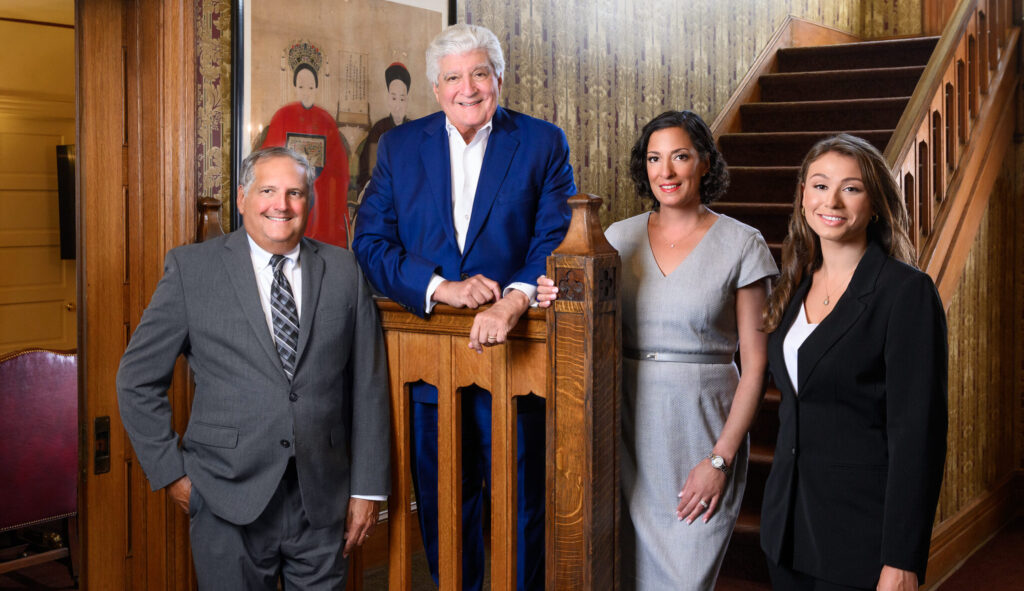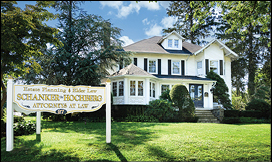Welcome Back

Schanker and Schanker PLLC is a premier Estate Planning law firm. We offer legal services for sophisticated Estate and Gift Tax planning, Decedent Estate Administration and Probate services, Business Succession Planning, Charitable Giving, Special Needs Planning for persons with disabilities, simple Will planning, and all aspects of Elder Law planning including Medicaid planning and applications. Our website, www.schankerlawfirm.com, provides detailed information about our practice and the services we offer. It also is an excellent resource for articles of interest about Estate Planning and Estate and Gift Tax Laws. A copy of each newsletter will always be available on our website.
Estate Planning is so much more than just tax planning. There is a considerable decision-making process. Schanker and Schanker PLLC has over 40 years of experience in counseling clients for their Estate Planning needs.
As always, we encourage feedback from our readers. If there are any topics you wish for us to specifically address or elaborate on, please email me at: andrea@schankerhochberg.com
The New York State Estate Tax Cliff
In New York, an Estate worth $6,580,000 (or less) has no New York State Estate Tax, however an Estate achieving a value of $6,909,000 has a State Estate Tax of $626,909.00 (and if in excess the tax will continue increasing of course). WHY? New York State has a State Estate Tax “cliff” which, if you fall off, will remove the otherwise available $6,580,000 State Estate Tax Exemption. If the value of the decedent’s Estate exceeds 105% of the available New York State Exemption, then the Estate is taxed from dollar ONE with no exemption applied and at a rate of between 5% and 16%. The example above illustrates this perfectly.
Any individual or married couple who have an Estate hovering around the available exemption needs to address additional planning.
What can be done to mitigate this glaring cliff? Understand that careful Estate Tax planning can mitigate, if not eliminate, a State Estate Tax. Estate related expenses and charitable bequests are not included in the value of the taxable Estate. Certain clauses can be included in the planning documents to give the Executor/Trustee discretion to make a charitable bequest (with parameters you define) so that the taxable Estate does not fall off the cliff. It saves taxes and serves a good cause!
Documents can be carefully drafted to allow a married couple (both being US citizens) to double the available Estate Tax Exemption between the two of them using a Trust structure at the time of the first death.
 A strategy of lifetime gifts (with custom designed parameters) can be implemented to also reduce the size of the taxable estate, thus further mitigating the taxable Estate. New York does not impose any gift tax. As long as you survive three (3) years from the date of the lifetime gift, you can reduce the size of your taxable estate without using any of the available New York State Estate Tax Exemption at the time of your death (this is known as the “claw-back rule” because if you die within three years of the gift, the value comes back into the taxable estate. It is crucial to address your Estate planning with knowledgeable and experienced Trusts and Estates Lawyers. Keep current with your documents
A strategy of lifetime gifts (with custom designed parameters) can be implemented to also reduce the size of the taxable estate, thus further mitigating the taxable Estate. New York does not impose any gift tax. As long as you survive three (3) years from the date of the lifetime gift, you can reduce the size of your taxable estate without using any of the available New York State Estate Tax Exemption at the time of your death (this is known as the “claw-back rule” because if you die within three years of the gift, the value comes back into the taxable estate. It is crucial to address your Estate planning with knowledgeable and experienced Trusts and Estates Lawyers. Keep current with your documents  and adjust to your changing net worth and your changing circumstances that will impact the consequences of your planning, or lack thereof. Schanker and Schanker PLLC offers initial consultations at no fee. We also offer annual review meetings at no fee to existing clients. Do not wait until it is too late to have done something. Please contact us to schedule a meeting and ensure that your planning is properly in place and appropriate for you. Our website offers a wealth of information past newsletters and an informative “glossary” including Estate Planning terminology.
and adjust to your changing net worth and your changing circumstances that will impact the consequences of your planning, or lack thereof. Schanker and Schanker PLLC offers initial consultations at no fee. We also offer annual review meetings at no fee to existing clients. Do not wait until it is too late to have done something. Please contact us to schedule a meeting and ensure that your planning is properly in place and appropriate for you. Our website offers a wealth of information past newsletters and an informative “glossary” including Estate Planning terminology.
Celebrity or Not: Without a Will, You Have No Control Over Who Receives Your Assets Upon Death
Martin Luther King, Jr., Kurt Cobain, Jimi Hendrix, Pablo Picasso, and Prince are just a small list of famous individuals who died without a Will.
Administration is a Court proceeding when no Will exists. In an Administration proceeding a “distributee” is a person who is entitled to the Estate’s assets. If the deceased is survived by a spouse and children, the spouse receives the first $50,000.00 and one-half of the remaining estate. The children will take the other half. If the deceased has only a surviving spouse, the entire estate passes to the spouse. If the deceased has only children, the estate will be divided equally between all the surviving children. In other words, dying without a Last Will and Testament turns the order and manner of an Estate’s inheritance over to the State default laws instead of what the deceased likely would have wanted.
Decades after Jimi Hendrix died in 1970, a legal battle continued regarding Hendrix’ estate, making it one of the most-litigated estates in the history of entertainment litigation. Hendrix died survived by his father, Al, and it was Al who inherited the $80 million dollar estate in its entirety. When Al passed away the Estate was left by him to his adopted stepdaughter, Janie and nothing was left to Hendrix’s brother, Leon. Leon then brought a lawsuit to win back his share of the estate as he claimed that Janie influenced Al to cut him out of the Will. Leon lost the suit, but the litigation did not end there. Janie, now in control of Experience Hendrix LLC, went on to file a suit against Leon and his partner for trademark infringement. Five years later, in 2014, the Court ruled in favor of Experience Hendrix LLC and a settlement was entered into. This ruling gave Experience Hendrix LLC the ability to go after any vendors who were selling unauthorized merchandise such as T-shirts or posters bearing the Hendrix name or his image. Jimi Hendrix is a guitar playing legend; however, he is also a legendary cautionary tale for estate planning.
dollar estate in its entirety. When Al passed away the Estate was left by him to his adopted stepdaughter, Janie and nothing was left to Hendrix’s brother, Leon. Leon then brought a lawsuit to win back his share of the estate as he claimed that Janie influenced Al to cut him out of the Will. Leon lost the suit, but the litigation did not end there. Janie, now in control of Experience Hendrix LLC, went on to file a suit against Leon and his partner for trademark infringement. Five years later, in 2014, the Court ruled in favor of Experience Hendrix LLC and a settlement was entered into. This ruling gave Experience Hendrix LLC the ability to go after any vendors who were selling unauthorized merchandise such as T-shirts or posters bearing the Hendrix name or his image. Jimi Hendrix is a guitar playing legend; however, he is also a legendary cautionary tale for estate planning.
At multimillionaire Pablo Picasso’s death in 1973, he left behind 45,000 works of art, but he did not leave behind a Will. “There is no Will,” Armand Antebi, Picasso’s lawyer and friend reported. “He never made one because of superstition. A way of avoiding death, one might say.” Picasso also died owning five homes, a portfolio of stocks and bonds, cash, and gold. As Picasso had four children with three women, dividing his assets took an estimated amount of $30 million dollars in attorney’s fees and six years of negotiations between not only his children but also his wife and mistresses. His family fought bitterly over his estate and the right to use his name and his image. The art collection went to the French Government in lieu if estate taxes and they opened the Picasso Museum with it!
At 57 years old in 2016, Prince died with an estimated $156 million dollar estate and without a Will. Six years later, his estate was finally settled. Prince died leaving behind no children and several full and half siblings. Two of his siblings predeceased Prince and one of them had a child. All of these individuals, including more than 45 other potential relatives, claimed to be rightful heirs to part of the estate. A Minnesota Court named Comerica Bank & Trust as legal representative of Prince’s vast Estate and ultimately awarded approximately $3 million dollars to them for their associated costs and expenses. Whatever was left over was split evenly between Prince OAT Holdings LLC and Prince Legacy LLC. Prince OAT Holdings LLC is owned by music publishing company Primary Wave which purchased its interests from three of Prince’s half-siblings. Prince Legacy LLC consists of interests previously held by the other three of Prince’s half-siblings. Prince’s half-sister, Sharon, after the hearing stated, “Prince can now rest in peace, we are free at last, thank God almighty, we are free, it’s been a long, long, grueling six years.”
 Administration proceedings are a matter of public record, and once the information regarding the estate of the decedent is submitted to Surrogate’s Court it becomes a matter of common knowledge and privacy is taken away from the family members. Generally, administration of an estate is much more expensive than Probate because of the uncertainty involved and the complete inability to plan for Estate taxes.
Administration proceedings are a matter of public record, and once the information regarding the estate of the decedent is submitted to Surrogate’s Court it becomes a matter of common knowledge and privacy is taken away from the family members. Generally, administration of an estate is much more expensive than Probate because of the uncertainty involved and the complete inability to plan for Estate taxes.
The moral of the “story” is to prepare for the inevitable and hire an Estate Attorney to make a Trust and/or Will directing how and to whom you want your estate distributed. If you don’t, you will leave a mess.
What Happens When…
| No Will | Will | Revocable Living Trust | |
| Surrogate’s Court | Administration Proceeding |
Probate Proceeding |
No Proceeding unless assets are not in Trust or in the individual name (except for legal actions existing at the time of death or arising from death) |
| Inheritance | Pursuant to State Statute |
If Will is valid, pursuant to directives in the Will | Pursuant to the Trust’s directives |
| Speed/Efficiency | Indefinitely delayed |
Indefinitely delayed |
Immediate |
The delays are catastrophic. Real Estate cannot be sold, cars cannot be re-registered, bank accounts are frozen. Even with Affirmations (Attorney sworn statements) of Urgency, the delay continues with no explanation of an expectation of when the process may be completed. The foundational reason for this is the dense population in which we live and volume of deaths meaning the volume of these proceedings in the Court system.
“If you fail to make a plan, you are planning to fail”
– Benjamin Franklin
OK, I Have a Will, Is My Estate Planning Done?
Probate is the proceeding in Surrogate’s Court where the Last Will and Testament is determined to be valid, and the Executor is appointed to administer the estate. The named Executor is given the authority to act by “Letters Testamentary”, which are issued by the Court. The Probate process is long and delayed. This is true even for small and simple estates. There is a tremendous backlog in the New York Surrogate’s Court system which imposes frustrating delays.
Probate is expensive. There are filing fees to the Court as well as a legal fee for your attorney.
At this point you may be asking yourself, how can I prevent my estate from going through Probate? A Revocable Living Trust is a valuable tool that is used to avoid Probate, as its primary purpose is to avoid Probate with respect to the assets that have been placed into the Trust during your lifetime. A Revocable Living Trust is commonly referred to as a “Will Substitute”, because, like a Will, it directs distribution of your trust assets at the time of death. Thus, assets titled in the name of the Revocable Living Trust will pass per your direction at the time of your death, immediately and without Court intervention. You are the sole Trustee of your Trust during your lifetime and while you are competent. Additionally, during your lifetime, you will have full use and control of any assets assigned to your Revocable Living Trusts. There is absolutely no effect on your ownership, use, or enjoyment of assets.
To further discuss avoiding the hassles of Probate and the creation of a Revocable Living Trust based Estate Plan, schedule an appointment with Schanker and Schanker PLLC.
 Our main office is housed in an elegantly restored Victorian structure in the heart of Huntington Village. Here, we welcome you and your family into a relaxing, warm setting where we will work together to improve your circumstances and achieve your goals.
Our main office is housed in an elegantly restored Victorian structure in the heart of Huntington Village. Here, we welcome you and your family into a relaxing, warm setting where we will work together to improve your circumstances and achieve your goals.
To better serve our clients and their families, we also have convenient office locations in Midtown Manhattan and New Jersey; we also offer our services to clientele in Florida.
Extensive Services Include
- Complimentary Initial Consultations for Estate Planning, Probate and Estate Administration matters (not for matters of Elder Law or Special Needs Planning)
- Complimentary Annual Review meetings for existing clients
- Complimentary Family meetings for existing clients
- Tax alert services for existing clients
Meet & Review
Schedule a complimentary appointment to review existing Estate Planning documents in our Long Island Office, our Manhattan Office, or our New Jersey office.
Contact us at our main telephone number at phone (631) 424-5400.

Andrea B. Schanker, Esq
Andrea B. Schanker, Esq – Partner, received her Bachelor of Arts degree in Clinical Psychology from University of Rochester in 1999 and her Juris Doctor from New York Law School in 2002. Andrea is a licensed member of the New York and New Jersey Bar Associations. She is the 2016 – 2017 President of the Huntington Lawyers Club, a member of the Suffolk County Bar Association and a member of the New York State Bar Association where she is an active member within the Trusts and Estates Section and the Elder Law and Special Needs Section. Ms. Schanker is also a member of the Suffolk County Bar Association and the American Bar Association.
Ms. Schanker joined Schanker and Schanker PLLC in 2004 as an Associate Attorney specializing in Estate Planning, Estate Administration, Business Succession Planning, and Elder Law. She regularly delivers Estate Planning presentations to professionals in the financial industry and their clients. Ms. Schanker also regularly advises accountants, financial advisors, and insurance advisors in connection with her areas of expertise.
Andrea lives in Huntington with her husband, Michael Abruzzo and their daughters, Patricia Gertrude Abruzzo and Sylvia Grace Abruzzo.
GENERAL DISCLAIMER: While we hope this newsletter provides useful information, please know that this newsletter does not predict or guarantee the outcome or result in any particular situation and no attorney-client relationship exists or is established as a result of this newsletter or its receipt
